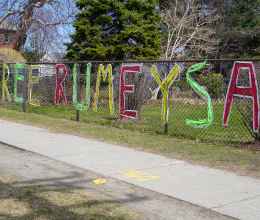
Case challenges unconstitutional “public comment” restrictions
The Massachusetts Supreme Judicial Court will today hear arguments in an important free speech case raising the question of when government officials can and cannot silence members of the public based on the substance of their input during “public comment” periods of government meetings.
The case, Barron v. Southborough Board of Selectmen, concerns a Southborough policy that allows public officials to censor criticism from members of the public. The policy mandates that “[a]ll remarks and dialogue in public meetings must be respectful and courteous, free of rude, personal, or slanderous remarks. Inappropriate language and/or shouting will not be allowed.” It was used to silence a resident merely for pointing out the Board had repeatedly violated the Open Meeting Law.
The ACLU of Massachusetts filed an amicus brief urging the Commonwealth’s highest court to strike down the policy because it authorizes content-based and viewpoint-based discrimination in a forum specifically created for members of the public to provide feedback—including criticism—to their public officials. According to the ACLU, the policy violates both the Massachusetts Constitution and the First Amendment of the U.S. Constitution.
Carol Rose, executive director of the ACLU of Massachusetts, today released the following statement:
“This case has serious implications for free speech and participatory democracy. The freedom to express criticism to and about public officials goes to the heart of what separates us from repressive regimes. This policy—and others like it—should not be allowed to stand; we urge the Court to make clear that relevant political speech in public comment periods cannot be suppressed.”
For the full ACLU amicus brief, go to: https://www.aclum.org/sites/default/files/aclum_amicus_-_barron_v._south...
For more information about the ACLU of Massachusetts, go to: https://www.aclum.org



